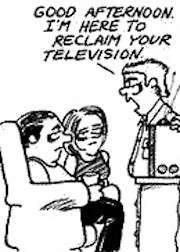Supreme Court Rules 6–3 Against Aereo
A setback for tech freedom.

For about two years, a New York–based business called Aereo has offered a useful service: It receives local TV broadcasts on thousands of tiny antennas, stores the programs on DVRs, and transmits them on demand to subscribers' laptops, tablets, and phones. Today the Supreme Court told the company to cut it out: Reversing a lower court's decision, it ruled 6–3 that Aereo's activities violate copyright law.
The big broadcasters don't like Aereo because it doesn't pay the fees that cable and satellite companies pony up for the right to retransmit programs. So they sued, claiming that Aereo's efforts amount to a public performance of their copyrighted material. During oral arguments, Aereo attorney David Frederick argued that this characterization of the company's activities was wrong, and that it was merely "providing antennas and DVRs" that let consumers do things that are legal.
The Court sided with the broadcasters. Writing for the majority, Justice Stephen Breyer points out that Congress amended the Copyright Act for the specific purpose of treating cable broadcasts of local TV channels as performances. What Aereo has been doing, Breyer concludes, is similar enough to qualify as a performance too. Frederick had argued that even if this were so, that would not make its service a public performance, since each transmission is received only by the user who requests it—a private transaction. The Court was unpersuaded, deciding that in practical terms this was still fundamentally the same as cable.
Justice Antonin Scalia's dissent—which was joined by justices Clarence Thomas and Samuel Alito—calls this an "improvised standard" that amounts to "looks-like-cable-TV." The dissenters deny that the company engages in a performance at all, let alone a public one. An Aereo transmission "undoubtedly results in a performance," Scalia writes, but "the question is who does the performing." If the answer to that question is unpalatable to the TV industry, the "proper course is not to bend and twist the [Copyright] Act's terms in an effort to produce a just outcome, but to apply the law as it stands and leave to Congress the task of deciding whether the Copyright Act needs an upgrade."
For more on the issue—and on what's coming next—here is a Reason TV video from earlier this month:


Show Comments (32)